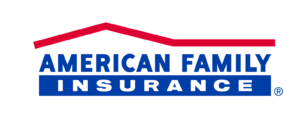The UW–Madison Diversity Forum, “Rising Above and Reshaping our World in the Image of Justice,” was held as a hybrid in-person & virtual conference on Nov. 2 & 3 with Dr. Russell Jeung, co-founder of Stop AAPI Hate, and Steven Canals, co-creator of “Pose,” as keynote presenters.
Keynote Speakers
Russell Jeung
Dr. Russell Jeung, professor of Asian American Studies at San Francisco State University and co-founder of the Stop AAPI Hate reporting center, provided the keynote address on day one.
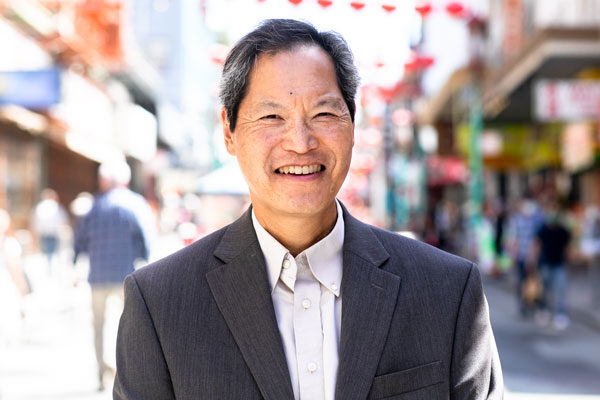
Steven Canals
Steven Canals, a screenwriter and producer best known for co-creating and executive-producing the FX television series “Pose,” provided the keynote address on day two of the Diversity Forum.
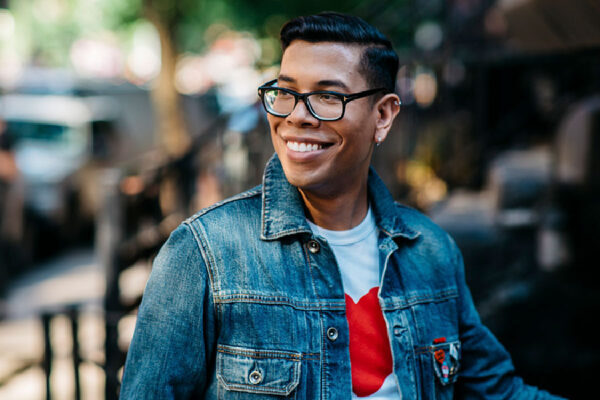
Latest updates
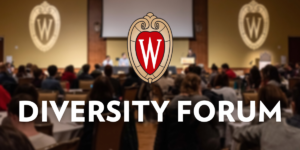
Call for Proposals: UW–Madison Diversity Forum 2022
The Division of Diversity, Equity & Educational Achievement is seeking proposals for breakout sessions for the annual UW–Madison Diversity Forum this fall.

Media coverage of the 2021 UW–Madison Diversity Forum
The 2021 UW–Madison Diversity Forum, “Rising Above and Reshaping our World in the Image of Justice,” was held as a hybrid in-person & virtual conference on Nov. 2 & 3 with Dr. Russell Jeung, co-founder …
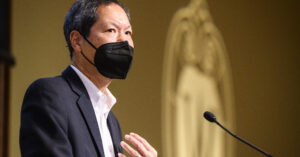
Diversity Forum keynote: Anti-Asian American hate another danger of pandemic
Stop AAPI Hate co-founder Dr. Russell Jeung gave the keynote at the hybrid UW–Madison Diversity Forum on Nov. 2, 2021.
Event Details
- Dates: Nov. 2 & 3, 2021
- Times: 8:30 a.m. – 4:30 p.m. CDT
- Location: Online webinar with limited in-person seating in Union South
- Cost: Free
- Contact: events@cdo.wisc.edu
Conference Agenda
Tuesday, Nov. 2, 2021 | 8:40 a.m. – 4:30 p.m
Hybrid conference with limited in-person seating in Varsity Hall, Union South. All times in Central Daylight Time.
| 8:40 – 9:00 a.m. | Welcome and Native Nations Tribute |
| 9:00 – 10:15 a.m. | Keynote — Ending Asian Hate: The Asian American Community Responds
Dr. Russell Jeung will discuss the nationwide rise in anti-Asian hate incidents that led to his co-founding the Bay Area nonprofit organization Stop AAPI Hate in 2020, for which he was recognized as one of Time magazine’s 100 most influential people for 2021. He explores the causes of this troubling surge, which he links to a larger, and little-known, history of anti-Asian prejudice that first took root in the western United States nearly two centuries ago. Looking to the future, Dr. Jeung shares how the Asian American community has organized and collaborated across linguistic, religious, gender, age, and ethnic lines to bring about an end to hate and bias incidents for all Americans, in the process helping to alter perceptions of what it means to be Asian American today. |
| 10:30 – 11:45 a.m. | The APIDA Community in Wisconsin: Our Lived Experiences on Campus and Beyond
The last year has been an especially difficult one for members of the Asian, Pacific Islander, Desi American (APIDA) community, who have been forced to grapple with a surge in anti-Asian sentiment and violence during the COVID-19 pandemic against the backdrop of a long history of anti-Asian discrimination. This session brings together a panel of APIDA-identifying faculty, staff, and students who will shed light on the varied backgrounds and shared experiences of the APIDA community at UW–Madison and in Wisconsin. The panel will share about their lived experiences, discuss the need for stronger community amongst APIDA-identifying colleagues, and address how the university community can create a more inclusive and welcoming environment for all. |
| 12:00 – 1:00 p.m. | Lunch & Outstanding Women of Color Awards Announcement |
| 1:00 – 2:15 p.m. | Breakout Sessions |
| Option One | Changing the Narrative of Policing in the Campus Environment: Exploring Intentional Campus Health and Safety Collaborations
College and university campuses are communities with many of the needs of any contemporary community. However, the unique characteristics of these communities make campus policing a parallel yet nuanced service that, at its best, seeks to support the maintenance of a safe learning environment and atmosphere to promote social development and wellness for all. In this light, campus policing is about more than public safety; it is part of the academic endeavor. A moderated panel of specialists in campus policing and members of the University of Wisconsin campus Police Advisory Council (PAC) will discuss the leading national role UWPD has in the innovative development and emerging practices of policing in contemporary campus settings. Attendees will increase their knowledge of UWPD philosophies, best practices, and current issues related to maintaining a safe and healthy campus community at UW–Madison. |
| Option Two | The Pandemics of COVID-19 and Racism: How to Transform Systems Built on Oppression to Systems Worthy of Trust
Racism is enmeshed in all our country’s key systems: healthcare, education, criminal justice, agriculture and beyond. Many systems struggle to build trust with historically oppressed communities. The refrain repeats: “How do we get communities to trust us?” But what if we instead asked, “How do we create a system that is worthy of trust?” Using the healthcare system as an example, with special attention to the inequity displayed during the COVID-19 pandemic, this panelist will explore this question from the perspectives of health leadership, education, research, clinical care, and community engagement. Attendees will leave empowered to transform their own system, whatever their field, through developing critical consciousness; creating accountability; challenging the status quo; and embodying a spirit of humility, respect, and willingness to listen. The use of storytelling and an action-oriented approach will provide ideas and tools for all, within and outside of healthcare. |
| Option Three | Who Belongs? Who Matters? Connecting Racism and Health Equity to Belonging at UW–Madison
A sense of belonging is the psychological feeling of connectedness to a social, spatial, or cultural group or community. Mattering and seeing oneself as part of an institution is an important topic within higher education. Research shows that certain students are denied belonging due to structural barriers reinforced through campus culture. At UW–Madison, students with the lowest sense of belonging hold marginalized identities (race/ethnicity, disability, first-generation, sexual orientation, gender identity, transfer status, nationality). COVID-19 and racial injustices further eroded belonging; therefore, addressing belonging is a necessary component to creating an inclusive and healthy campus. This session will share data regarding belonging at UW–Madison, address the interconnectedness between racism and belonging, and share promising practices from peer institutions. Participants will interact with the data, discuss their experiences, and explore strategies for structural change. |
| 2:45 – 4:15 p.m. | Campus and Community Forum — Mobilize, Legislate, and Engage: Securing Voting Rights in Wisconsin and Beyond
A diverse panel of Wisconsin scholars, activists, and community leaders joins us to discuss why voting rights are at a critical juncture both statewide and nationally. What role do demographics play in driving efforts to restrict voter mobilization? How are communities in Madison, Milwaukee, and outlying areas responding to ongoing legislative efforts to limit who votes and when? What can neighborhood activists do to encourage robust turnouts in marginalized communities? And how can the media help to educate our electorate on critical questions facing them at the ballot box? |
Wednesday, Nov. 3, 2021 | 8:45 a.m. – 4:30 p.m.
Virtual-only. All times in Central Daylight Time.
| 8:45 – 9:00 a.m | Welcome and Native Nations Tribute |
| 9:00 – 10:15 a.m | Breakout Sessions |
| Option One | A Rubric for Anti-Racism in Campus Units
This workshop will introduce attendees to an ongoing project to create an anti-racist, liberatory rubric specifically for UW–Madison departmental use. The aim of the project is to help those who populate and guide our departments to organize themselves when asking the questions: How are we perpetuating racism and oppression right here in our workplace, and what can we do to change that? During this workshop, attendees will be given an opportunity to provide feedback on an outline of the current project and share ideas on additional aspects of anti-racist work that should be taken on by individual departments and units. The three guiding beliefs of this rubric are (1) shared power and mutual respect, (2) transparency and intentional communication, and (3) equitable distribution of resources. |
| Option Two | Building a Wisconsin That Works for Everyone: Prioritizing Diversity, Equity, and Inclusion
State government protects the safety and well-being of Wisconsinites and creates conditions that allow individuals, businesses, and communities to thrive. Everyone should benefit equally from this work but not all of us do. The Evers administration has made diversity, equity, and inclusion a priority. This session will explore the ways his administration is building not just a better state government but a better state where diversity is celebrated, different perspectives are heard and respected, needs of all communities are addressed and met, and all are welcome to be a part of positive change. |
| Option Three | Healing and Harmony for the Socially Homeless: Asian Women Scholars in the U.S. Academy
This session will present the history of Asian Women Scholars, with specific information on the group’s unique blend of academic conferences and workshops (with a few distinctive features) and social gatherings featuring diverse Asian foods. A series of individual presentations will focus on mental health care and emotional resilience, social work and vulnerable populations, restorative justice and racial awareness in law school, human emotion and self-expression through the arts, and music therapy and Asian identity. The session will conclude with a panel discussion on the challenges faced by Asian women scholars, balancing academic success with advocacy and activism, and maintaining an infrastructure of caring in times of crisis and beyond. |
| Option Four | Documenting and Learning from Our History: Archives as Sites of Social Change
The COVID-19 pandemic and the uprising of 2020 revealed deep fissures in the way our society understands and thinks about its history. These historical understandings and misunderstandings are not separate from UW–Madison. Our campus histories are deeply ingrained in how we understand the university and ourselves as members of this community, yet they are often under-recognized in discussions of diversity and equity on campus. The UW Archives and the Public History Project are working to expand the university’s history with a focus on centering underrepresented communities. This panel discussion will detail these efforts including the Archives’ student historian, a role designed to empower students of color to document their communities’ history, and the Public History Project, a multi-year effort to uncover histories of discrimination on campus. Panelists will reflect on the challenges of this work and provide direction for how others may contribute to these efforts. |
| 10:30 – 11:45 a.m | Breakout Sessions |
| Option One | The Next 400: Completing the Dream of Dr. King
Dr. Martin Luther King Jr’s dream didn’t stop at social, civil, or voting rights, but advanced to economic inclusion and financial justice before his murder. Black Millennials & Generation Z know what the last 400 years looked like in America. What will we do differently to remix Black Life for the next 400? Join an international conversation focusing on vibrant, intergenerational and an educational environment for Black professionals. Our goal is to inspire organic, new connections amongst the emerging working young professional Black culture. |
| Option Two | Inequity in Higher Educational Access and Success in the Age of COVID-19: Emerging Research and Collaborative Efforts to Bolster Outcomes for Black and Brown Students
COVID-19 has laid bare and exacerbated systemic inequities and injustices across our society. Black and brown youths have faced increasing challenges that threaten to extend college access gaps and connected career and life outcomes. In this breakout session, we bring together professionals from various roles in higher education in the southeastern Wisconsin region to discuss the ways that immigrant, Latino/a, Black and first-generation students’ educational trajectories have been affected. We will offer emerging research about these impacts and identify concrete needs and actions to address inequity and the differential impacts of COVID-19, including financial burdens, mental health concerns, and logistics like FAFSA completion. We will engage the audience in a conversation about how data and networks can be harnessed for collective action to intervene and develop effective supports for these young people. |
| Option Three | The Secret Sauce of Collaboration: How All-In Milwaukee and UW–Madison are Removing the Red Tape for Limited-Income Students of Color
All-In Milwaukee is a college completion program that provides financial aid, advising, program, and career support to high potential, limited-income, diverse Milwaukee students to complete college, build meaningful careers and transform the Milwaukee community. All-In Milwaukee operates from the belief that coordination and collaboration drive superior outcomes. UW–Madison’s Office of Student Financial Aid has played a critical role in supporting scholars on their college journey, and has worked diligently to help foster relationships across campus. Thus far, the program has supported 39 scholars at UW–Madison and even after a tough pandemic year, 100% of those matriculated are still enrolled. The strong relationship between the program and the university enabled it to help tackle the challenges students faced in the pandemic in a swift and coordinated way. |
| 12:00 – 1:00 p.m | Processing Space
Join the Learning Communities for Institutional Change and Excellence (LCICE) team for an interactive session over lunch to process your experiences this year at the Diversity Forum – your thoughts, feelings, insights, and challenges. This session will provide space to integrate your new learning in community with others, including small and large group dialogue, reflection, and somatic engagement. You will leave with more insight about your experiences, and more clarity about how you want to use your learning in your work/role. Note: You must pre-register to participate in this session. Registration is capped at 250 for this session to allow for small group breakout rooms. This session will not be recorded for later viewing. Live captions will not be provided during this session. Please email events@cdo.wisc.edu if you require an accommodation to participate in this session. |
| 1:00 – 2:15 p.m | Breakout Sessions |
| Option One | Indigenous Activism: Past & Present
This panel, composed of American Indian Studies Program faculty, provides an overview of historic and contemporary Indigenous activism across what is now the United States. As Indigenous activism has garnered local and national attention in recent years, particularly with widespread coverage of the Dakota Access Pipeline, Missing and Murdered Indigenous Women, and boarding schools in the US and Canada, this panel seeks to historicize the many ways Native communities have worked to assert their sovereignty while working to protect tribal members, homelands, and cultural practices and simultaneously ensuring a better world for future generations. Building on each faculty members expertise, this timely panel pays particular attention to Alaska Natives, environmental concerns, Native women, urban Indians, access to housing, and boarding schools. Taken together, this panel offers UW community members with important information and the tools to contextualize media portrayals of Indigenous activism and to better understand what is at stake for Native people across the US. |
| Option Two | Microaggressions Ouch! When a Mosquito Bite Turns into an Infection
Microaggressions are defined as brief and commonplace daily verbal, behavioral, or environmental indignities, whether intentional or unintentional, that communicate hostile, derogatory, or negative racial slights and insults toward people of color. Often the impact of microaggressions is minimized to a mosquito bite or paper cut. But left untreated or undressed mosquito bites can become infected. Microaggressions cause harm that impacts the health of the person. At UW–Madison, 62% of undergraduate students of color report experiencing a microaggression. This session will be a workshop that examines UW–Madison campus data around microaggressions, the impact microaggressions have on the individual, and action and awareness participants can take to address intervening in microaggressions. This will be an interactive workshop with quotes of UW students virtually and physically posted in the space, as well as worksheets and action steps to address microaggressions. |
| Option Three | Digital Inclusivity: Best Practices in Digital Accessibility to Create Inclusive Work, Teaching, and Learning Environments
The COVID-19 pandemic required a quick and significant transition from onsite in-person work, learning, or social interactions, to working, learning, or socializing remotely and through digital means. The university’s collective efforts were successful in maintaining its operations and fulfilling its mission, but the experience uncovered digital inequities for individuals with disabilities. As we continue to recover from the pandemic, we realize that operating through digital modes of communication offers many benefits and flexibility and is likely to continue to be a mainstay of how we live, work, and learn. In line with our values of diversity and inclusion, this presentation focuses on the need to be intentional in valuing the diverse needs of individuals with disabilities. We will share best practices, practical applications, and campuswide resources for creating and delivering accessible digital resources and technology for students, faculty, staff, and the broader community. |
| Option Four | The Discussion Project: Successful Discussion Requires Diversity, Equity, and Inclusion
Participants will be introduced to the work and research findings of The Discussion Project at UW–Madison. Presenters will offer a definition of discussion and why discussion is an integral part of a student’s educational experiences. We will focus on the ways in which high quality discussion requires that instructors take responsibility to build inclusive and equitable learning environments that draw strength from the diversity of students in the classroom. The presenters will detail methods for building classroom community and explain how instructors can cultivate and maintain a classroom climate that helps produce a “discussion class,” and participants will take part in case study discussions that requires instructors to take leadership in repairing classroom climate and relationships when a rift occurs. |
| 2:30 – 3:30 p.m | Keynote — Centering and Uplifting Multiply Marginalized Voices: A Conversation with ‘Pose’ Co-Creator Steven Canals
Steven Canals, who co-created the groundbreaking FX show “Pose,” joins us for a wide-ranging conversation about how the critically acclaimed show came to be, his personal journey as a queer Afro-Puerto Rican in higher education and the entertainment industry, and how the show worked to center the voices and experiences of multiply marginalized people. “Pose” tells the story of the struggles and triumphs of Black, Latine, gay, trans and nonbinary performers in the New York drag ball scene in the ‘80s and ‘90s. Over three seasons the show featured the largest transgender cast ever assembled in a scripted series, revolutionizing the landscape of transgender representation in Hollywood. Joining Canals for this conversation is Warren Scherer, assistant dean and director of the UW–Madison Gender and Sexuality Campus Center. |
| 3:45 – 4:30 p.m | Strike A Pose: A Student Panel on Representations of Multiply Marginalized Identities
Gabe Javier, associate vice chancellor for student affairs in the area of identity and inclusion, will convene a panel of UW–Madison students for a conversation about “Pose,” representation, and the lived experience of people with multiple intersecting marginalized identities. |

